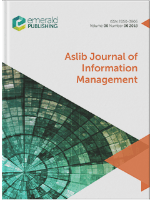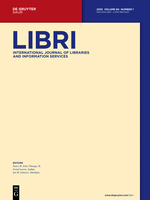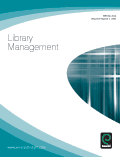
LIBRARY AND INFORMATION SCIENCE
Scope & Guideline
Empowering librarianship through innovative research.
Introduction
Aims and Scopes
- Public Library Services and Community Engagement:
Research on how public libraries adapt their services to meet the needs of diverse community groups, including older adults and visually impaired individuals, demonstrating the role of libraries in fostering social inclusion. - Academic and Educational Support:
Exploration of the role of university libraries in supporting learning and collaboration between library services and academic programs, emphasizing strategies to enhance student engagement and information literacy. - Information Needs and User Studies:
Investigation into the information needs of various user groups, including qualitative studies involving stakeholders, which provide insights into how libraries can better serve their communities. - Metadata and Information Systems:
Research on the technical aspects of library science, including the conversion of bibliographic records to modern metadata standards, and the application of ontologies in information organization. - Policy and Organizational Analysis:
Analysis of the implementation of library policies and the collaboration between libraries and other organizations, highlighting the strategic role libraries play in broader societal frameworks.
Trending and Emerging
- Support for Marginalized Groups:
Emerging research on the services provided by libraries to marginalized groups, such as older adults and the visually impaired, indicates a growing emphasis on inclusivity and community-oriented service models. - Collaboration and Policy Implementation:
Increasing focus on the collaboration between libraries and other organizations, particularly in the context of policy implementation and entrepreneurship support, reflects the evolving role of libraries as community hubs. - Qualitative Research Methodologies:
A trend towards qualitative methodologies, such as grounded theory and ethnomethodological studies, highlights a shift in understanding user experiences and needs, moving beyond quantitative measures. - Integration of Technology and Metadata:
The ongoing research into the conversion of bibliographic records and the application of modern metadata standards signifies an emerging focus on technology's role in the evolution of library science.
Declining or Waning
- Historical Library Education Models:
Research focusing on historical models of library education, such as the early post-war education framework, appears to be less prevalent, suggesting a shift towards contemporary educational practices and theories. - General Information Media Use:
Studies on general information media use, while still relevant, have seen a reduction in focus compared to more specialized or targeted studies that address specific user needs or contexts. - Static Policy Analysis:
The analysis of library policies without a focus on dynamic implementation or collaborative frameworks is declining, indicating a move towards more applied research that examines real-world impacts and collaborative efforts.
Similar Journals

Nauchnye i Tekhnicheskie Biblioteki-Scientific and Technical Libraries
Integrating Science and Technology in Library ServicesNauchnye i Tekhnicheskie Biblioteki-Scientific and Technical Libraries is a vital resource in the field of library and information science, particularly focusing on the integration of scientific and technical knowledge within library services. Published by the Russian National Public Library Science & Technology, this journal serves as a platform for researchers, professionals, and students to explore innovative approaches in library management, information dissemination, and technological advancements that shape the future of scientific libraries. With the ISSN 0130-9765, the journal aims to promote scholarly communication and provide insights into the latest trends and methodologies in the realm of scientific and technical libraries. Though currently not designated as an open-access journal, its content is an important contribution to the body of literature that supports the evolution of library services in the fast-paced information age. Located in Moscow, Russia, the journal embodies a commitment to enhancing the scientific community's access to quality library resources, thereby fostering a culture of knowledge sharing and continual professional development.

Bibliotecas-Anales de Investigacion
Unveiling Trends in Information ServicesBibliotecas-Anales de Investigacion is a prominent scholarly journal dedicated to the field of Library and Information Sciences, published by BIBLIOTECA NACL CUBA JOSE MARTI, with its esteemed presence based in Havana, Cuba. This journal (ISSN: 0006-176X, E-ISSN: 1683-8947) plays a crucial role in disseminating research and insights relevant to the evolving landscape of library operations, information management, and user services. Acknowledged for its rigorous peer-review process, it is indexed in Scopus, currently classified in the 2023 Q4 quartile, ranking 199 out of 280 in its category, marking a significant contribution to the academic community despite its modest percentile of 29th. The journal welcomes original research articles, case studies, and reviews that explore contemporary issues and developments in library science, creating an inclusive platform for both seasoned scholars and emerging voices. Interested readers can anticipate a robust exploration of topics from information retrieval to digital libraries, aligning with the journal's objective to enhance knowledge and practice within the library and information sector. As the journal converges its themes from 2019 to 2024, it remains a vital resource for researchers, professionals, and students aiming to stay informed on the latest trends and innovations in the field.

Aslib Journal of Information Management
Navigating the Dynamics of Information Management ExcellenceThe Aslib Journal of Information Management, published by Emerald Group Publishing Ltd, stands as a vital resource within the field of library and information sciences, enjoying a prominent position in the academic landscape with an impressive 2023 impact factor. This journal embraces a wide-ranging scope that encompasses innovative research, practical applications, and theoretical advancements in information management. Reflecting its exceptional quality, it has achieved a Q2 ranking in Information Systems and a distinguished Q1 ranking in Library and Information Sciences as of 2023. With its Scopus rankings placing it in the 83rd percentile for Library and Information Sciences, the journal is a leading platform for both scholars and practitioners seeking to advance knowledge in the discipline. The journal is committed to open access, fostering greater visibility and accessibility of research outputs. As it converges on its tenth anniversary (2014-2024), the Aslib Journal of Information Management continues to be an essential tool for researchers, professionals, and students eager to navigate the rapidly evolving landscape of information management.

Investigacion Bibliotecologica
Empowering Knowledge Sharing in Library and Information SciencesInvestigacion Bibliotecologica, published by the National Autonomous University of Mexico, stands as a vital resource in the field of library and information sciences. With a legacy of open access publishing since 1986, this journal endeavors to disseminate high-quality research which aims to advance knowledge and practices within the library and information sector. With an ISSN of 0187-358X and E-ISSN 2448-8321, it has secured its position in the competitive landscape of scholarly communication, earning a commendable Q3 ranking in its category as of 2023. The journal's influence is reflected in its Scopus ranking within the library and information sciences field, where it ranks #151 among 280 journals. Located in Mexico City, it provides scholars, professionals, and students with open access to its content, facilitating knowledge sharing and academic collaboration. As it continues its publication journey from 2008 to 2024, Investigacion Bibliotecologica remains an essential platform for innovative inquiries, practical insights, and the latest developments in library science.

LIBRI-International Journal of Libraries and Information Studies
Unveiling the Dynamics of Information ManagementLIBRI - International Journal of Libraries and Information Studies, with ISSN 0024-2667 and E-ISSN 1865-8423, is a premier academic publication in the field of library and information science. Published by the esteemed Walter de Gruyter GmbH in Berlin, Germany, this journal has carved a distinguished place in academic discourse, earning a Q2 ranking in 2023 within its category, which underscores its impact and relevance to the community. With a comprehensive history spanning from 1950 and ongoing coverage until 2024, LIBRI provides a platform for rigorous research and innovative studies that advance the understanding of libraries and information systems globally. Researchers, professionals, and students are invited to engage with its diverse articles that cover a plethora of topics relevant to today’s information landscape. Although not an open-access journal, its contributions are valuable for those seeking to enhance their knowledge and stay updated in a rapidly evolving field.

Malaysian Journal of Library & Information Science
Connecting Researchers and Practitioners in MalaysiaMalaysian Journal of Library & Information Science, published by the University of Malaya, Faculty of Computer Science & Information Technology, serves as a crucial platform for researchers, professionals, and students in the field of Library and Information Sciences. With a commitment to advancing scholarly knowledge, this journal has consistently showcased significant research contributions since its inception in 1996, and is currently indexed in Scopus, ranking in the 62nd percentile among its peers. The journal's Q2 categorization reflects its growing impact and relevance in the scholarly community. Although it operates as a traditional subscription-based journal, the publication holds great importance for those looking to delve into innovative practices and emerging trends within library and information sciences. Researchers and practitioners can access valuable insights that contribute to a deeper understanding of the evolving landscape in Malaysia and beyond. Addressed from Kuala Lumpur, Malaysia, the journal welcomes contributions that further exploration and scholarship in the vital field of information dissemination and management.

African Journal of Library Archives and Information Science
Connecting Scholars, Inspiring Solutions.The African Journal of Library Archives and Information Science (ISSN: 0795-4778; E-ISSN: 0795-4778) is a pivotal publication in the field of Library and Information Sciences, published by ARCHLIB & INFORMATION SERVICES LTD in Nigeria. With a focus on the diverse and evolving challenges faced by libraries and information professionals in the African context, this journal serves as a platform for scholarly communication, fostering innovation and collaboration among researchers, practitioners, and academics. The journal has a notable impact factor, reflected in its Q3 ranking within the category for 2023, and is indexed in Scopus, holding a percentile rank of 22nd in its field, further validating its relevance and scholarly contribution. Running since 2008 with continual publications through to 2024, the journal aims to advance knowledge, share best practices, and highlight emerging trends in librarianship and information science across Africa and beyond. By offering open access options, it ensures wide dissemination of knowledge, making it an essential resource for those dedicated to enhancing information services and archives.

Library Management
Connecting Scholars to Cutting-Edge Library PracticesLibrary Management, published by Emerald Group Publishing Ltd, is an esteemed academic journal dedicated to the field of Library and Information Sciences. Since its inception in 1979, the journal has continued to be a vital resource for researchers, scholars, and practitioners interested in the evolving practices of library management, information organization, and the role of libraries in the digital age. With an impressive Q1 ranking in the Library and Information Sciences category and a strong performance in Scopus metrics (ranked #85 out of 280), Library Management offers innovative insights and evidence-based research that aim to enhance library services and management practices globally. As an essential contributor to the academic and professional landscape, the journal's objectives include promoting scholarly discourse, fostering best practices, and providing a platform for cutting-edge research that addresses current challenges and opportunities in library management. Researchers and professionals in the field can access a wealth of knowledge without open access barriers, ensuring that the latest findings are available to those dedicated to advancing the discipline.

Biblios-Revista de Bibliotecologia y Ciencias de la Informacion
Fostering Engagement in Library Science DiscourseBiblios-Revista de Bibliotecologia y Ciencias de la Informacion, published by the University of Pittsburgh's Library System, stands as a pivotal contributor to the field of Library and Information Sciences. Holding an ISSN of 1562-4730, this peer-reviewed journal has been offering Open Access content since 2011, reinforcing its commitment to the democratization of knowledge. Despite its current classification in the Q4 quartile with a Scopus rank of 257 out of 280 in its category, the journal plays a crucial role in disseminating research that explores contemporary challenges and innovations within the library science landscape. It is particularly relevant for researchers, practitioners, and students invested in the future of information management and bibliographic studies. With coverage from 2014 to 2024, Biblios provides a platform for scholars to engage with critical discourse, share findings, and enhance the global library and information community.

AIB Studi
Championing accessibility in library research.AIB Studi is a vital peer-reviewed journal published by the ASSOC ITALIANA BIBLIOTECHE-AIB, focusing on the dynamic field of Library and Information Sciences. Since its inception in 2012, the journal has embraced an Open Access model, ensuring that research is accessible to a global audience without financial barriers. Based in Italy, AIB Studi promotes scholarly discourse and innovative practices in the library sector. With an emerging reputation reflected in its 2023 Quartile Rank of Q3 in Library and Information Sciences and a current Scopus ranking of #210/280, it serves as an essential resource for professionals, researchers, and students seeking to advance their knowledge and contributions to the field. The journal publishes articles that delve into the evolving role of libraries in society, explore technological advancements, and examine information management strategies, fostering an environment of collaboration and progressive development in library sciences.